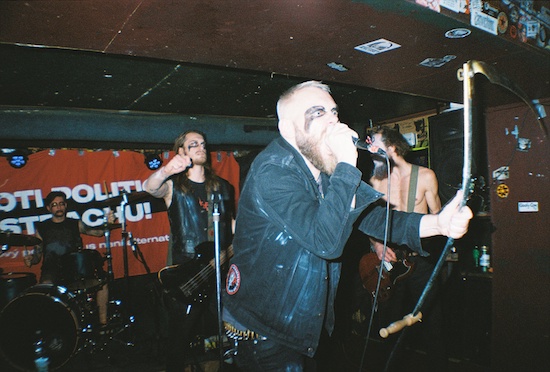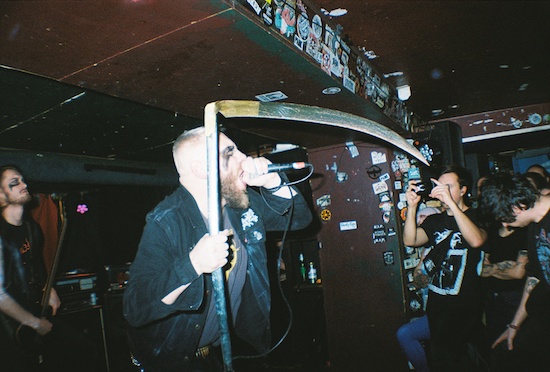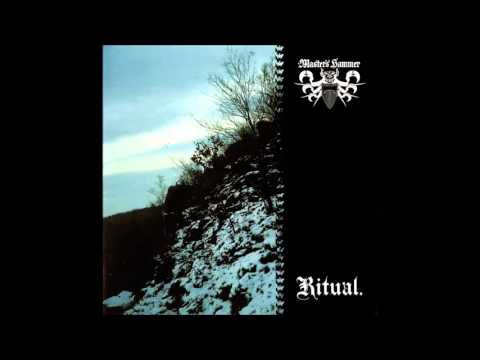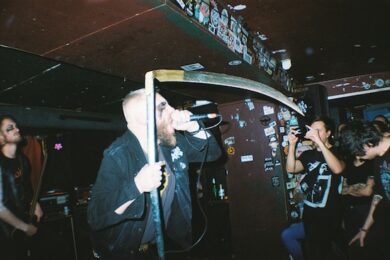Walking past a country chalet colony, you pass by a pet cemetery; the floodlit image of the chapel ruin in the distance beckons you. You need to watch your step, so as not to fall into one of the unmarked graves. You happen to be in one of the darkest places in Prague – a cemetery for the mentally ill next to the Bohnice psychiatric hospital. In front of the chapel is an improvised bar built out of beer crates, occupied by hardcore fans and goths, clad in the kind of long coats you’d see in The Crow. In an instant, fragments of conversation and the humming of the diesel generator are pierced by a guitar riff, and warpaint-sporting members of the band Bahratal set their machine in motion – their Panzerfaust is a mixture of 80s thrash metal and noise punk. "She’s bleeding like the cunt of Holy Mary," the singer screams, and the bass player draws an inverted cross in the air.
Bahratal named their series of illegal cemetery concerts the "Triumph Of The Will", after Leni Reifenstahl’s Nazi propaganda film. Adhering closely to the black metal handbook, they: celebrate evil, nihilism, misanthropy, paganism and Christian heresy. Bass player Vojta describes one concert experience almost as a revelation: "Everything happened so fast. In the middle of a circular cemetery chapel near Most was a bonfire, and we played right next to it. All around us were people with painted faces, we were getting feedback from the PA, everything was really loud, I was looking at the sky – and then evil engulfed me and my head began to spin." He notes that the band have chosen a former Nazi factory near Sokolov as the site of their next year’s performance. Which begs the question: is such revelling in the aesthetics of evil simply more jaded, antinomian provocation, or is it an expression of a sincerely held political stance?
"It’s a risk of style", says 38-year-old singer Marek, who is laconic on the ideological confusions of extreme music subcultures. For their band, Nazi references are just punk provocations, part of the theatre. "We want to piss people off. We know where our place is, and our creed is solidarity and respect for others, even though we may bring knives or scythes to gigs," clarifies Marek, who’s been on the local independent music scene for over twenty years, in emo-hardcore bands Lakmé and Remek and the electronic project V0nt.
In other cases however, the symbolism of evil goes much deeper, permeating into everyday life and politics. Some extreme musicians can’t really decide what their standpoint is, one statement often contradicting another. In the Czech Republic we have several overtly racist bands that are internationally renowned. "I’ve always thought of Black Metal’s association with National Socialism as another means of rebellion and hatred towards the outside world, similar to all of Anti-Christianity," says Michal, formerly a singer of one such band,the Děčín-based Sekhmet.
This kind of provocation will always find an audience, observes Marek of Bahratal, a long-time psychotherapist by profession, and who for many years was part of the activist hardcore scene but he grew tired of the same political conversations and the feeling that he was persuading those who were already persuaded. At present, Marek devotes his free time to studying World War II history, publishes the Kolyma Tales fanzine where he takes interest in bands with borderline or extremist themes and symbology with the exactitude of a historian – he uncovers the political background of power electronic projects such as Xenophobic Ejaculation or Streicher and untangles the bonds of labels like Satanistic Skinhead Propaganda, where you can find crust bands together with Neo-Nazi groups. Strong ideological statements against NSBM and hazardous music are marked almost on every page although he finds some of them fascinating.
"I’m interested in the music because of its extremes," he says. "I’ll never buy their T-shirt or an album, they won’t get any of my money. But they might be interesting because they’re pushing musical expressiveness." Marek’s bandmate Vojta, ten years his junior, fills in: "Sometimes I don’t feel all that great about it, but the desire to listen to it and look at the other side is stronger. I’ve always been more interested in Mordor and the Orcs in Lord Of The Rings."
Thanks to Bahratal, both of them are fulfilling their long-time boyhood dreams which hark back to local cult bands Master’s Hammer or Törr, both formed under the Socialist regime, who also influenced foreign legends like Darkthrone and Sunn O))). Bahratal even took their slogan, "Cult of death and violence", from a 1988 review of a Törr’s gig published in the Communist newspaper Rudé právo [Red Justice], where the actions of "fanaticised hairies" are described as follows: "Hands with clenched fists threateningly rose towards the dormant sky. ‘Heil! Heil! Heil!’ echoed over the amphitheater." Törr’s co-founder Vlasta Henych may still be a controversial figure (his swastika ring is infamous on its own), but he sits in the distinct category of "Czech rocker over fifty", representing what Marek refers to as the "classic dullness in metal".
The younger noise and post-industrial scene is not only more refined, but also more ambivalent. For example, the Prague musician Willhelm Grasslich and his infamous power-electronics project Uncle Grasha’s Flying Circus supposedly explores the nature of social taboos. "The ‘uncle’ in the title is an archetype of a pedophile, but it was also the Allies’ nickname for Stalin during the Second World War," explains Grasslich, who is fascinated by psychoanalysis, WWII, and the horrors of the Soviet regime, as evidenced by albums like Stalinist Nun (2015) and Stalinist God (2018). Grasslich’s music bears witness to mankind’s most brutal actions, while also sexualising them: "You could look at it as an attempt at a perverse joke. I utilise aesthetics of the avant-garde and of propaganda, where everything is intertwined and where borderlines disappear."
Yet Grasslich performs at anti-racist events and his own political views aren’t reflected in his music. He succinctly sums up his approach: "You put on a uniform of sorts, which you don’t normally wear when you go out, and then you take it off again." Such Laibach-style provocations are the sort of "shock tactic", mentioned in Jennifer Wallis’ noise music book Fight You Own War (2016): "You need to dig below the level of simplistic interpretations, which is something that requires careful analysis. The questions and interpretations of listeners are actually more important than the music itself." However the shock tactics themselves have to be consistently demystified.
"As a teenager, you look for far-out trips. The mystery, all of those snowy, black and white forests, the musk – all of that attracted me," Michal describes his journey to black metal, having performed in Moravská zima (Moravian Winter) andí Sekhmet, both of which were repeatedly monitored by Czech Anti-fascist organisations. Today, Michal still enjoys listening to Mayhem or Darkthrone, but has distanced himself from the black metal scene. He participates in LARPs and makes his own costumes and plays orc with his friends as the leader of the Snaga tribe while out on nature walks. "If you listen to black metal and have a penchant for orcs, it’s usually not because you’re a massive people-lover," muses Michal over the connection between Lord Of The Rings and black metal, which for him started with Tolkien. In this he is far from alone; Varg Vikernes once posed for a photo with a map of Middle Earth, and he appropriated the Count Grishnack monicker from one of Tolkien’s Orc leaders. Burzum means "darkness" in the language of Mordor.
Theatricality is also a deep part of black metal’s appeal. Michal’s fondest memories are of concerts where they could go wild with costumes referencing their pagan heritage. "They destroyed the freedom of Slavonic blood! Let them await the coming of Moravian winter," cries Moravian Winter’s song ‘Native Landr’. For Michal, this heroic ethos represented a fantasy world of supernatural beings, in which he sided with evil, rather than a real world nationalism. In Sekhmet, he felt drawn to Satanism and misanthropy rather than Neo-Nazism, despite playing songs called ‘Zyklon B’ or ‘History Of Hate’. "If you go and attack someone based on a song’s lyric, then you’re an idiot," he tells me. This however somewhat simplifies the problem and it comes across as a clichéd argument. The subculture and music influences your identity, and emancipation through music can’t help but have a darker and more sinister side.
"There is purity in blood, there is nation in blood, there is strength in blood, justice, and hate!", states the song ‘Sekhmet’ from 2006. The music and lyrics were written by the band co-founder Set, who, according to Antifa research, regularly attended Neo-Nazi demonstrations in Northern Bohemia, and was in close contact with extreme nationalists. "I just want to point out that I don’t drag National Socialism into Sekhmet’s lyrics. It is just my personal conviction," he states in a historical interview. An email to Set asking about his current position went unanswered. According to political scientist Jan Charvát, a longtime observer of Neo-Nazi manifestations in the Czech music scene, Set’s story is fairly typical: "According to locals, Set used to wear long hair and smoke dope, then he got beaten up by Roma and shaved his head."
The Ústí nad Labem region in Northern Bohemia boasts the largest unemployment rate in the country, and in the past hosted massive anti-Roma demonstrations, courtesy of the traditionally strong local Neo-Nazi scene, which also serves as a host for German ultra-right groups over the border. It is second only to Prague for "extremist-motivated criminality", as noted by the Czech interior ministry. History is heavy here. Jews were exterminated during death marches. The Postoloprty massacre occurred as part of the deportation of the local Germanic population shortly after WWII. NSBM bands are drawn to the region specifically because of its dark history. In 2012 the Finnish band Goatmoon arrived on Adolf Hitler’s birthday, playing in front of a Nazi flag at an event organised by Hendrik Möbus from German NSBM band Absurd. "When you look at Hitler’s Black Order and the SS troops without prejudice, you’ll see soldiers, who fanatically believed in a vision, and went on a mission," he muses on his webpage. The concert was eventually dispersed by the police.
Michal plays down the influence of bands such as these. According to him, their significance is small in a time when hate and xenophobia is being spread by mainstream politicians: "To chase around some fringe genre bands of underground relevance seems counter-productive to me." There may be something to it, as the band Ortel has scored highly at the Nightingale musical awards, the Czech equivalent of the Grammys. Ortel from Plzeň are an openly neo-Nazi group whose lyrics primarily target Roma and religious minority groups. But still, in current anti-immigrant climax when one can hear xenophobic statements from mainstream politics, we cannot let the underground become infected with bands promoting genuinely extremist politics, event if their influence is only local. "I’ve never sided one way or the other… I don’t have a need to judge someone based only on their faith or the colour of their skin," reflects Michal, who left Sekhmet due to the somewhat too orthodox views of other band members. "At the same time, I won’t be calling people Nazis just because they’ve got a Burzum patch, as happened to me a few times."
Similar neutrality within the scope of the genre is debatable – and mostly hypocritical. While many members of the black metal scene may tolerate NSBM as being part of the genre, left-wing bands on the other hand condemn it. A good example of this were reactions to the anti-fascist black metal compilation Go And Look (2016), which, among others, featured the bands Marnost and Smuteční slavnost, the members of which now form Bahratal. The proceeds from the sales went to the Good Night White Pride campaign. At the time, concerns were voiced on the Echoes Zine blog whether it was appropriate to "involve an organisation in black metal which for unknown reasons effectively goes against the genre." The author was fairly broad in his conclusions: "And you know what, don’t involve politics in music. It’s bullshit. Notwithstanding the fact that black metal was always against everything and everyone."

"If you’re interested in integrity, then you’re going to kick a person with a Burzum patch out from a hardcore concert," says Charvát about the Czech left-wing hardcore scene. At the Brutal Assault metal festival, a Burzum merch is almost mandatory, but these T-shirts can also be observed at the Creepy Teepee festival in Kutná Hora, which features contemporary pop music, anti-nationalist posters and queer artists. Within this largely left-wing, anti-Nazi context, Burzum patches reflect a hipster ambiguity. The question is, where does rational observation end and uncritical fascination begin? "If you claim yourself as a black metal fan and you don´t know Burzum, you´re probably a hypocrite,“ notes Vojta from Bahratal, though he wouldn´t buy a Burzum T-shirt himself.
"Satanists, Nazis or Stalinists, what can be more evil?" asks Charvát of the paths to absolute negation often used by extreme subcultures to position themselves as opposing conformity. According to Charvát "this demarcation can’t really be too rational or intellectually clearly anchored, because then bands would have to explain themselves". Hard-to-decipher puzzles may however hide the danger that provocation or controversial metaphors may in fact hide hateful ideology. The extreme right knows that orthodox racism is largely outmoded, and so it needs to find a new language – or to hide in subcultural scenes. According to Charvát, a band’s lyrics and aesthetics may mean one thing, but the decisive element is in their actions, for example whether they play at Neo-Nazi events, or participate in their rallies, making it important then to observe them over time.
"Darkness is a part of our maturing process," says Marek of Bahratal. "Within my therapeutic practice, I haven’t met many people who were engulfed by darkness and shadows. It was mainly fear, or a need to chase shadows back. It’s partially possible to chase them from one’s mind, but in my opinion, a healthier approach is to cultivate and nurture them…"
And then it’s up to us to decide how far we let it go, while being aware there may not be a route back.
EDITOR’S NOTE: This feature was adapted and translated from a piece which ran in the cultural magazine A2 earlier this year. There are many actual unambiguous Neo-Nazi groups operating in the Czech Republic. We elected to ignore this scene and keep the focus of this feature tight on the areas where there is some confusion. Sadly, the Czech Neo-Nazi scene is so large that it acts as something of a beacon. For example, Steve Drakos, formerly of Skrewdriver, now lives near Brno where he operates fascist EBM group Front Of Hell with his son




